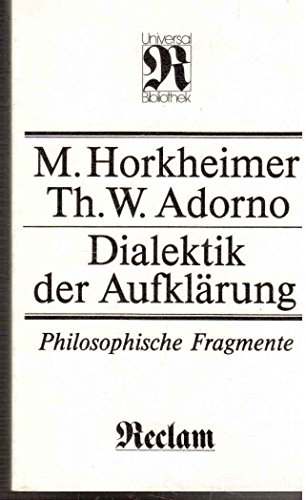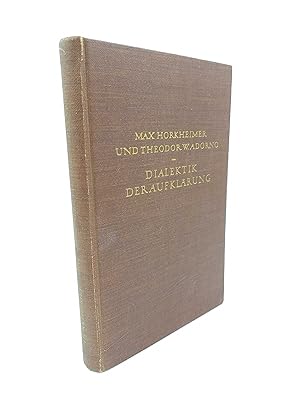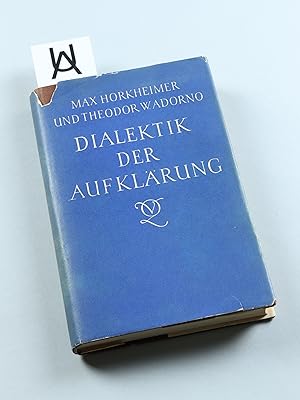dialektik aufklärung philosophische fragmente, Erstausgabe (8 Ergebnisse)
FeedbackSuchfilter
Produktart
- Alle Product Types
- Bücher (8)
- Magazine & Zeitschriften (Keine weiteren Ergebnisse entsprechen dieser Verfeinerung)
- Comics (Keine weiteren Ergebnisse entsprechen dieser Verfeinerung)
- Noten (Keine weiteren Ergebnisse entsprechen dieser Verfeinerung)
- Kunst, Grafik & Poster (Keine weiteren Ergebnisse entsprechen dieser Verfeinerung)
- Fotografien (Keine weiteren Ergebnisse entsprechen dieser Verfeinerung)
- Karten (Keine weiteren Ergebnisse entsprechen dieser Verfeinerung)
- Manuskripte & Papierantiquitäten (Keine weiteren Ergebnisse entsprechen dieser Verfeinerung)
Zustand
- Alle
- Neu (Keine weiteren Ergebnisse entsprechen dieser Verfeinerung)
- Antiquarisch (8)
Einband
Weitere Eigenschaften
- Erstausgabe (8)
- Signiert (Keine weiteren Ergebnisse entsprechen dieser Verfeinerung)
- Schutzumschlag (3)
- Angebotsfoto (4)
Sprache (2)
Gratisversand
- Kostenloser Versand nach USA (Keine weiteren Ergebnisse entsprechen dieser Verfeinerung)
Land des Verkäufers
Verkäuferbewertung
-
Dialektik der Aufklärung : philosophische Fragmente. Max Horkheimer u. Theodor W. Adorno. [Hrsg., mit Nachw. u. Personenreg. vers. von Waltraud Beyer] / Reclams Universal-Bibliothek ; Bd. 1325 : Philosophie, Geschichte, Kulturgeschichte
Anbieter: nika-books, art & crafts GbR, Nordwestuckermark-Fürstenwerder, NWUM, Deutschland
Erstausgabe
EUR 14,00
Währung umrechnenEUR 20,18 für den Versand von Deutschland nach USAAnzahl: 1 verfügbar
In den Warenkorb8° , Taschenbuch, 1. Auflage,. 332 Seiten, Einband geschmutzt, auf wenigen Seiten Bleistiftunterstreichungen und Anmerkungen, Seiten papierbedingt nachgedunkelt, sonst in einem guten Zustand. 9783379005197 Sprache: Deutsch Gewicht in Gramm: 179.
-
Dialektik der Aufklärung - Philosophische Fragmente.
Verlag: Verlag P. Reclam jun. Leipzig, 1989
ISBN 10: 3379005193 ISBN 13: 9783379005197
Sprache: Deutsch
Anbieter: Antiquariat BücherParadies, Wettin-Löbejün, Deutschland
Erstausgabe
EUR 14,00
Währung umrechnenEUR 29,00 für den Versand von Deutschland nach USAAnzahl: 1 verfügbar
In den WarenkorbBroschiert. Zustand: Gut. 1. Auflage. Klein-Oktav. Erste Auflage, 332 Seiten. Band 1325. Broschiert. Einband gering nachgedunkelt, sonst gut erhalten. /D0202.
-
Dialektik der Aufklärung. Philosophische Fragmente
Verlag: Amsterdam, Querido Verlag, 1947
Anbieter: Antiquariat Smock, Freiburg, Deutschland
Erstausgabe
EUR 200,00
Währung umrechnenEUR 12,90 für den Versand von Deutschland nach USAAnzahl: 1 verfügbar
In den WarenkorbZustand: Akzeptabel. Formateinband: Leinenband / gebundene Ausgabe 310 S. Erstausgabe / 1. Aufl. der endgültigen Fassung (zuvor bereits 1944 unter dem Titel »Philosophische Fragmente« beim New York Institute of Social Research im Exil erschienen); Leinenband ohne Schutzumschlag; Außen etwas gealtert; Papier gebräunt und leider durchgehend mit vielen Kuli-Anstreichungen; sonst gut erhalten. Sprache: Deutsch Gewicht in Gramm: 550 [Stichwörter: ].
-
Dialektik der Aufklärung. Philosophische Fragmente.
Verlag: Amsterdam, Querido Verlag, 1947, 1947
Anbieter: Antiquariat Hans Hammerstein OHG, München, Deutschland
Erstausgabe
EUR 260,00
Währung umrechnenEUR 35,00 für den Versand von Deutschland nach USAAnzahl: 1 verfügbar
In den WarenkorbOriginal-Broschur, 8°, 310 Seiten. Erste Ausgabe der endgültigen Fassung des 1944 noch unter dem Titel "Philosophische Fragmente" erschienen Kritschen Theorie der Frankfurter Schule. Umschlag berieben und leicht angestaubt, Rücken an den Kanten bestossen, sonst gut.
-
Dialektik der Aufklärung. Philosophische Fragmente.
Verlag: Amsterdam, Querido,, 1947
Sprache: Deutsch
Anbieter: Matthaeus Truppe Antiquariat, Graz, Österreich
Erstausgabe
EUR 128,40
Währung umrechnenEUR 38,00 für den Versand von Österreich nach USAAnzahl: 1 verfügbar
In den Warenkorb310 S., 1 Bl. Erste Ausgabe der endgültigen Fassung des 1944 noch unter dem Titel "Philosophische Fragmente" erschienen Klassikers der Kritschen Theorie der Frankfurter Schule. - Sternfeld/T. 230. - Mehrfach gestempeltes Bibliotheksexemplar mit Kleberesten und hs. Nummer am hinteren Buchinnendeckel. Titelblatt und Vorsatz mit Verklebungen. Gebräunt und mit einigen Anstreichungen in Bleistift. *** *** Copyright: Matthaeus TRUPPE Buchhandlung & Antiquariat - Stubenberggasse 7 - A-8010 Graz - ++43 (0)316 - 829552 *** *** Sprache: Deutsch Gewicht in Gramm: 0 8°. OLwd. (stark berieben, etw. bestoßen).
-
Dialektik der Aufklärung. Philosophische Fragmente. In: Gesammelte Schriften. Bd. 3.
Verlag: Frankfurt a. M., Suhrkamp,, 1981
Sprache: Deutsch
Anbieter: Buch & Cafe Antiquarius, Bonn, NRW, Deutschland
Verbandsmitglied: GIAQ
Erstausgabe
EUR 69,00
Währung umrechnenEUR 16,00 für den Versand von Deutschland nach USAAnzahl: 1 verfügbar
In den Warenkorb8°, OLnbd. mit Schutzumschlag. 1. Aufl. 335 S. Hier die gesuchte Leinenausgabe seines maßgeblichen Werkes. Schutzumschlag minimal bestoßen, sonst schönes Ex. Sprache: Deutsch Gewicht in Gramm: 0.
-
Dialektik der Aufklärung. Philosophische Fragmente.
Verlag: Amsterdam, Querido,, 1947
Sprache: Deutsch
Anbieter: Antiquariat Walter Markov, Bonn, Deutschland
Erstausgabe
EUR 300,00
Währung umrechnenEUR 45,00 für den Versand von Deutschland nach USAAnzahl: 1 verfügbar
In den Warenkorb310 S., 1 Bl. Pfäfflin/Sörgel 151, Sternfeld/T. 230. Erste Ausgabe der endgültigen Fassung, des zuvor bereits 1944 unter dem Titel "Philosophische Fragmente" im Exil erschienen Bandes. *-*-*-*-*- SHIPPING COSTS to other EU-COUNTRIES occasionally may be less than indicated. To OTHER COUNTRIES IN THE WORLD they may be different (often less or rarely more, according to the weight and wether you wish insurance). -*-*-*-*-* Sprache: Deutsch OLn., Einband gering berieben, Kapitale ganz leicht eingedrückt; Seiten ein wenig gebräunt; der Falz d. ersten Bogens durch stramme Bindung am Kopf eingerissen; aus Raucherhaushalt; ansonsten gut erhalten.
-
Dialektik der Aufklärung. Philosophische Fragmente.
Verlag: Amsterdam, Querido Verlag, 1947
Sprache: Deutsch
Anbieter: Antiquariat Uhlmann, Zürich, Schweiz
Erstausgabe
EUR 491,84
Währung umrechnenEUR 30,00 für den Versand von Schweiz nach USAAnzahl: 1 verfügbar
In den WarenkorbOLwd. m. Farbkopfschnitt u. OU. 8°, 310 S., 1 Bl. Inhaltsverzeichnis. OU am Rücken etw. beschienen, mit Verlust im Vorderdeckel oben (1,5 x 1,5 cm) sowie etw. randrissig, äusserste Bl. etw. gebräunt, Buch sonst allg. tadellos. EA. Ein Verlagszuettel beiliegend («Wenn Sie nach der Lektüre dieses Buches den Wunsch haben, regelmässig über unsere Verlagstätigkeit unterrichtet zu werden [. . .]»).


![Bild des Verkäufers für Dialektik der Aufklärung : philosophische Fragmente. Max Horkheimer u. Theodor W. Adorno. [Hrsg., mit Nachw. u. Personenreg. vers. von Waltraud Beyer] / Reclams Universal-Bibliothek ; Bd. 1325 : Philosophie, Geschichte, Kulturgeschichte zum Verkauf von nika-books, art & crafts GbR](https://pictures.abebooks.com/inventory/md/md31735471523.jpg)




